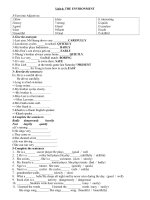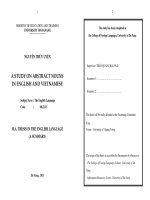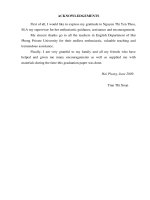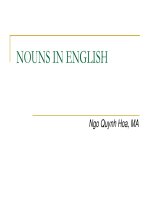bài giảng nouns in english
Bạn đang xem bản rút gọn của tài liệu. Xem và tải ngay bản đầy đủ của tài liệu tại đây (7.05 MB, 307 trang )
NOUNS IN ENGLISH
Ngo Quynh Hoa, MA
WHAT IS A NOUN?
John, Mary, London, Friday
Brother, child, nurse, mother
Bear, deer, dog, parrot, fish
Arm, face, pencil, spoon, table
Aim, beauty, belief, friendship
Writing, talking, swimming, dancing
Nouns are words or names for people,
places, animals, or things.
FORMS OF NOUNS
“I‟m just going along to the shop on the corner
to buy vegetables and collect the newspapers”
called Kay to her mother. I won‟t take the dogs
– when they bark they annoy people and
frighten children.
Nouns may be singular or plural. Plural
nouns usually end in s. But some plural nouns
don‟t end in s.
FORMS OF NOUNS
“Well, you can take them for a walk up the hill or
round the park later – it‟ll be good for them to get
away from home”, said her mother. “They haven‟t
had an outing for a while, so they do need some
exercise. This weather is ideal.”
Nouns can be used with the articles the or a/an.
Some nouns (such as home, school) can be used
with zero article. Determiners such as
possessive, quantifiers and demonstratives can
be used with nouns.
FORMS OF NOUNS
Kay picked up her shopping bag, opened the
front door, and stepped out on to the footpath. A
van-driver stopped for her as she used the
pedestrian crossing. It was a lovely warm day as
she headed for the shop on the corner.
Nouns need not be single words: they may be
compounds (consisting of two or more words).
Or they may be phrases (usually called noun
phrases)
FUNCTIONS OF NOUNS
The sun shone down. Kay enjoyed its
warmth as she ran along to the end of the
street. The shop was actually a small
supermarket now, but everybody still called it
„the shop‟ or „the corner shop‟.
FUNCTIONS OF NOUNS
A noun can be:
1. The subject of a verb
2. The object of a verb
3. The object of a preposition
4. The complement after a linking verb
5. The object complement
6. The adjectival before another noun
Ex 1: Find out the functions of red nouns
1. I became an actress quite by accident.
2. I walked into the sitting room.
3. Have you fed the cat?
4. Which region are you from?
5. The judges voted James the winner.
6. Mum and Dad usually get up about 6 am.
7. Is that light switch faulty?
8. We didn‟t dare make a sound.
Ex 1: Find out the functions of red nouns
1. Which lecture are you going to?
2. You‟re standing on my toe.
3. We often run along the river bank for
exercise and enjoyment.
4. Are you a doctor?
5. She called me a fool.
6. Be a man!
7. Rain clouds were approaching.
8. We are planning to review the school
curriculum.
TYPES OF NOUNS
Nouns can be broadly classified into 2 main
groups:
Proper nouns: the names of particular people, places,
things, buildings, and publications (have capital
letters).
David, Mr. Green, Hanoi, Friday, The Times
Germans, Muslims, Coca-cola, Christianity
Common nouns: all other nouns. Among common
nouns there are several types.
PROPER NOUNS
Names of people and animals.
Names of things
The months of the year
The days of the week
The festivals of the year
Famous buildings, monuments, and places
Countries, cities and towns
Oceans, seas, lakes, rivers, mountains and islands
Titles of magazines, newspapers, books and movies
Languages
Beliefs and their followers (Buddhism – Buddhists; Islam –
Muslims; Judaism – Jews; Christianity – Christians)
Match the countries to their capitals
Country Capital Country Capital
1. Belgium
2. Egypt
3. German
4. India
5. Pakistan
6. Thailand
7. China
Islamabad
Bangkok
New Delhi
Brussels
Cairo
Berlin
Beijing
8. France
9. Great
Britain
10. Italy
11. Korea
12. The USA
13. Japan
London
Rome
Paris
Tokyo
Seoul
Washington
DC
PROPER NOUNS
Groups of people
Business companies and other organizations
The people of countries
Country People Country People
Australia
Canada
Egypt
Germany
Indonesia
Sweden
Japan
Thailand
Wales
France
Pakistan
Switzerland
Spain
Singapore
ANSWERS
Country People Country People
Australia
Canada
Egypt
Germany
Indonesia
Sweden
Japan
Australians
Canadians
Egyptians
Germans
Indonesians
Swedes
The Japanese
Thailand
Wales
France
Pakistan
Switzerland
Spain
Singapore
Thais
The Welsh
The French
Pakistanis
The Swiss
Spaniards
Singaporeans
COMMON NOUNS
Countable and uncountable nouns
Concrete nouns
Abstract nouns
Collective nouns
Common-gender nouns
Masculine nouns
Feminine nouns
Neuter nouns
Definitions
Concrete nouns refer to things you can see and
touch.
Abstract nouns refer to things you cannot see or
touch.
Collective nouns are words for groups of people
or things.
Masculine nouns are words for men and boys,
and male animals and birds.
Feminine nouns are words for women and girls,
and female animals and birds
Neuter nouns are words for things.
Write the plural form
Singular Plural Singular Plural
Idea
Branch
Kimono
Kangaroo
Hero
Buffalo
Baby
Bay
Thief
Belief
Knife
Scarf
Café
Staff
Aircraft
Deer
Fish
Sheep
Mouse
Bureau
ANSWERS
Singular Plural Singular Plural
Idea
Branch
Kimono
Kangaroo
Hero
Mango
Baby
Bay
Thief
Belief
Ideas
Branches
Kimonos
Kangaroos
Heroes
mangos/es
Babies
Bays
Thieves
Beliefs
Knife
Scarf
Café
Staff
Aircraft
Deer
Fish
Sheep
Mouse
Bureau
Knives
Scarfs/ scarves
Cafés
Staffs
Aircraft
Deer
Fish / fishes
Sheep
Mice
Bureaux/bureaus
UN or CN?
The fastenings are made of metal.
Gold is a precious metal.
I love cheese. Is this a Dutch cheese?
I‟ve made a pot of coffee.
Waiter! Another coffee! I ordered two coffees and
three teas.
Beer is made from the fruit of the hop plant.
I feel like a nice cold beer. Shall I get beers for
everyone?
Don‟t waste the paper.
I went out to buy a paper.
The pond was covered with ice.
Would you like an ice?
Helen has lovely wavy hair.
Mum pulled out a grey hair.
Add a pinch of salt to the pastry mixture.
Dave cur three slices of bread.
I‟ve bought a melon.
There‟s some melon left. Would you like a
piece of melon?
How many fish did you catch?
Who would like this last bit of fish?
UN & CN
It is quite common for UN also to be CN, for
example, in the sense of:
A variety of a material, food, etc.
A portion or helping of something
An object made of or connected with a material
An individual piece of something
Some CN can be turned in to UN, for example,
fruits or vegetables or other foods that can be
divided into pieces or portions, or turned into a
mass by cooking or beating.
Some Abstract Noun Endings
-ness (qualities): Adj. + ness N
-ion (activity): V + ion N
-y, -ty, -ity (qualities, states): Adj. + -y… N
-ance, -ence (states, process):
V or Adj. + -ance/-ence N
-hood (the state of being a certain thing)
-ment (the activity of doing or the state produced
by the verb)
-our (qualities, states, activities)
Parts of speech
Noun Noun
Cold (a)
Great (a)
Act (v)
Instruct (v)
Permit (v)
Honest (a)
Loyal (a)
Active (a)
Major (a)
Annoy (v)
Occur (v)
Confident (a)
Patient (a)
Important (a)
Child (n)
False (a)
Manage (v)
Amaze (v)
Treat (v)
Behave (v)
ANSWERS
Noun Noun
Cold (a)
Great (a)
Act (v)
Instruct (v)
Permit (v)
Honest (a)
Loyal (a)
Active (a)
Major (a)
Annoy (v)
Coldness
Greatness
Action
Instruction
Permission
Honesty
Loyalty
Activity
Majority
Annoyance
Occur (v)
Confident (a)
Patient (a)
Important (a)
Child (n)
False (a)
Manage (v)
Amaze (v)
Treat (v)
Behave (v)
Occurrence
Confidence
Patience
Importance
Childhood
Falsehood
Management
Amazement
Treatment
Behaviour
Collective Nouns
The air force the army
A crew a band
The government a family
A party the staff
The navy a team
A crowd of fans the broad of directors
An army of ant a swarm of bees
A pile of books a series of book
Furniture clothing
People the police
Cattle folk









